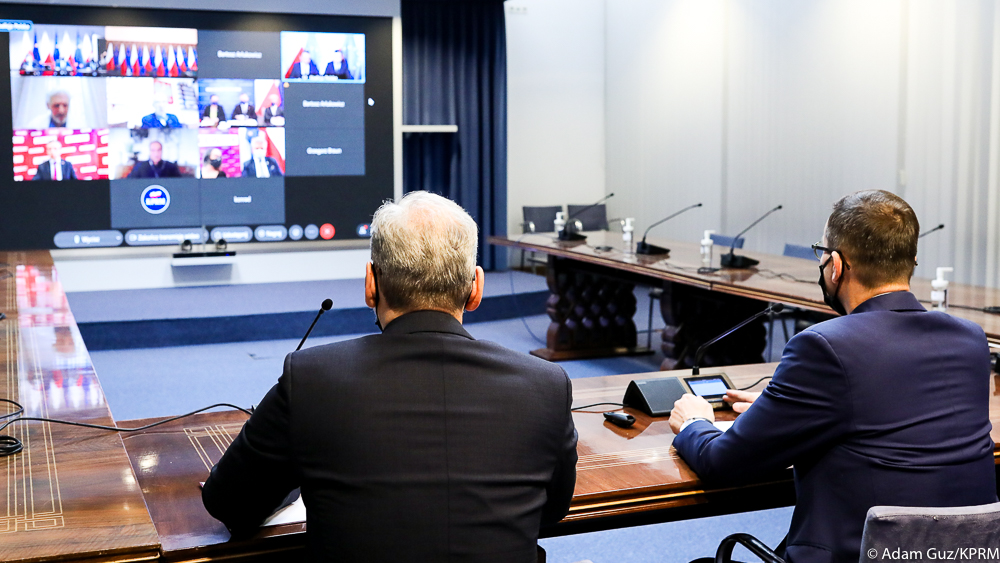Leaders from all parliamentary groups in Poland met today to discuss how to respond to a Europe-wide slowdown in production of coronavirus vaccines. The delayed deliveries have disrupted Poland’s vaccination timetable.
The talks, described as “heated”, resulted in suggestions to obtain vaccines outside the European Union’s joint procurement scheme. The leaders also discussed a potential loosening of lockdown restrictions, which is rumoured to begin to take place from next week.
For more on Friday's rush to register for vaccines, which saw seniors standing in queues outside health facilities or struggling to get through to overwhelmed phone lines, see our report https://t.co/78dztA6H9W
— Notes from Poland 🇵🇱 (@notesfrompoland) January 24, 2021
Tuesday’s meeting was attended by leaders from the ruling national-conservative Law and Justice (PiS) party as well as all opposition groups: the centrist Civic Coalition (KO), The Left (Lewica), the centre-right Polish People’s Party (PSL) and far-right Confederation (Konfederacja).
The head of the prime minister’s office, Michał Dworczyk, who is overseeing the government’s vaccine rollout, said that the talks had yielded “demands” from “representatives of probably all political circles” that the government “should start talks about obtaining vaccines outside the EU [mechanism],” reports TVN24.
Cezary Tomczyk, the head of KO’s parliamentary caucus, claimed that, when asked about alternative procurement plans, the government said “it did not have any”. The health minister, Adam Niedzielski, however, said that they were “constantly analysing various possibilities” but could not disclose details “due to the delicacy of the matter”.
Earlier in January, it transpired that Germany had secured 30 million additional doses of the Pfizer vaccine in its own negotiations parallel to the EU’s collective scheme. Dworczyk described it as a “lack of solidarity” by Berlin.
Krzysztof Szczerski, then chief of staff to President Andrzej Duda, said that, faced with the “disloyalty of individual states”, Poland should also “consider discussions with suppliers if the European vaccine purchasing system completely fails”.
Germany has shown a "lack of solidarity" by purchasing Covid vaccines outside the EU mechanism, says the head of the Polish PM's office.
But an @EU_Commission spokesman says individual countries will only receive vaccines after EU contracts are fulfilled https://t.co/q9dPtVmNqU
— Notes from Poland 🇵🇱 (@notesfrompoland) January 19, 2021
The leader of PSL, Władysław Kosiniak-Kamysz, inquired about earlier claims by PiS-backed Duda that, during his visit to the White House just ahead of elections last summer, he had secured priority access to vaccines.
Due to US-Polish collaboration on developing vaccines, “Poles can count on the fact that they will be available to us as soon as possible”, said Duda at the time. “Poland will get quick access to the vaccine,” added Trump.
Referring back to such claims, Kosiniak-Kamysz said he was now “asking for a description of the achievements of the negotiations with the US. What amount had been negotiated? Was this another big fake and a promotion for Andrzej Duda on the back of the coronavirus?”
Kiepsko się ten news zestarzał. https://t.co/lFDZoFal4r
— Marcin Makowski (@makowski_m) December 26, 2020
Meanwhile, Marcelina Zawisza from The Left questioned why Poland had “unfortunately not taken any steps” to produce the vaccine – which is currently made by Pfizer at its production site in Puurs, Belgium – itself.
In a rare show of cross-party agreement, however, Dworczyk noted that opposition MEP Bartosz Arłukowicz had voiced an “interesting” proposal to administer vaccines to cancer patients, which the government would consider when more doses became available in the future.
Dworczyk also announced that “the good news is that – apart from Confederation – we all have the same goal: to efficiently vaccinate the largest possible part of the population in our country,” reports TVN 24.
Just over half of Poles (51%) believe that the system created by the government to register for coronavirus vaccines is functioning badly, while 45.6% perceive it positively, according to a United Surveys poll https://t.co/LSAzNXYIUd
— Notes from Poland 🇵🇱 (@notesfrompoland) January 26, 2021
The leaders also discussed the current coronavirus lockdown, which has been in place since mid-October. Hotels, restaurants and sports facilities are currently almost entirely closed to in-person visitors, while all but the youngest three year groups in schools are learning from home.
The current restrictions will remain in place until at least the end of January. But the government is rumoured to be considering partial re-openings from next week. Some businesses have recently been opening in defiance of the rules, with some claiming that they are illegal.
Niedzielski said that during the “very heated” talks there were divergent opinions, “even within the opposition”. Some had advocated a loosening of restrictions, while others were calling for an extension of the current rules into mid-February.
For more on the growing number of Polish businesses choosing to reopen in violation of lockdown restrictions, which some claim are illegal, see our recent report https://t.co/sozLm98tfM
— Notes from Poland 🇵🇱 (@notesfrompoland) January 25, 2021
Main image credit: Adam Guz/KPRM/Twitter

Maria Wilczek is deputy editor of Notes from Poland. She is a regular writer for The Times, The Economist and Al Jazeera English, and has also featured in Foreign Policy, Politico Europe, The Spectator and Gazeta Wyborcza.




















